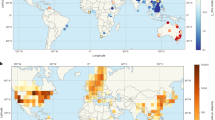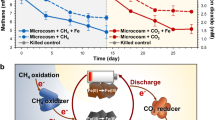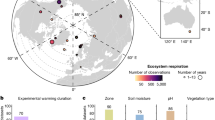Abstract
THE sour gas wells of Alberta form the basis of its sulphur industry. The well known Claus process is used, whereby part of the H2S is oxidised to SO2 which is in turn reacted with more H2S to yield elemental sulphur. As a consequence, more than 1,200 t of sulphur per day are discharged into the atmosphere in Alberta, mostly as SO2. Using sulphur isotope abundances, I have assessed the uptake of these emissions by vegetation.
This is a preview of subscription content, access via your institution
Access options
Subscribe to this journal
Receive 51 print issues and online access
$199.00 per year
only $3.90 per issue
Buy this article
- Purchase on Springer Link
- Instant access to full article PDF
Prices may be subject to local taxes which are calculated during checkout
Similar content being viewed by others
References
Thode, H. G., Monster, J., and Dunford, H. B., Am. Ass. Petrol. Geol. Bull., 42, 2619–2641 (1958).
Hitchon, B., Brown, H. M., and Krouse, H. R., Geol. Soc. Am. Abstr., 7, 118 (1975).
Lowe, L. E., Sasaki, A., and Krouse, H. R., Can. J. Soil Sci., 51, 129–131 (1971).
Author information
Authors and Affiliations
Rights and permissions
About this article
Cite this article
KROUSE, H. Sulphur isotope abundance elucidate uptake of atmospheric sulphur emissions by vegetation. Nature 265, 45–46 (1977). https://doi.org/10.1038/265045a0
Received:
Accepted:
Issue Date:
DOI: https://doi.org/10.1038/265045a0
This article is cited by
-
Significance of the long-term biomonitoring studies for understanding the impact of pollutants on the environment based on a synthesis of 25-year biomonitoring in the Holy Cross Mountains, Poland
Environmental Science and Pollution Research (2021)
-
Plant sulfur isotopic compositions are altered by marine fertilizers
Archaeological and Anthropological Sciences (2019)
-
Characterization of sulfur deposition over the period of industrialization in Japan using sulfur isotope ratio in Japanese cedar tree rings taken from stumps
Environmental Monitoring and Assessment (2015)
-
Sulfur isotopic signatures of water-soluble sulfate in needles of Pinus Massoniana Lamb in two Chinese areas
Environmental Earth Sciences (2015)
-
34S tracer study of pollutant sulfate behaviour in a lowland peatland
Biogeochemistry (2009)
Comments
By submitting a comment you agree to abide by our Terms and Community Guidelines. If you find something abusive or that does not comply with our terms or guidelines please flag it as inappropriate.



